I identify so strongly as a person who writes daily that I sometimes find myself bowled over by the fact that I haven’t always done it.
Since my first attempt to write a novel (at age 13), I’ve known that I really enjoy writing. The problem was that I could never really get myself to write. I managed the occasional short story for a contest and I pulled off NaNoWriMo when I was 20, but even after that, writing remained something that happened almost at random. Even when I had something I really wanted to write it was a toss-up as to whether I would be able to sit down and get it on a page.
This continued for a while. Up until January 1st, 2015, I had written maybe 100,000 words. Since then, I’ve written something like 650,000. If your first million words suck – as is commonly claimed – then I’m ¾ of the way to writing non-sucking words.
What changed in 2015? I made a New Year’s Resolution to write more. And then, when that began to fall apart a few months later (as almost all New Year’s Resolutions do), I sought out better commitment devices.
Did you read my first paragraph and feel like it describes you? Do you want to stop trying to write and start actually writing? If your brain works like mine, you can use what I’ve learned to skip over (some of) the failing part and go right to the writing every single day part1.
Step 1: Cultivate Love
I like having completed writing projects to show off as much as the next person, but I also enjoy the act of writing. If you don’t actually enjoy writing, you may have a problem. My techniques are designed to help people (like me) who genuinely enjoy writing once they get going but have trouble forcing themselves to even start.
If you find writing to be a grim chore, but want to enjoy writing so that you can have the social or financial benefits (heh) of writing, then it will be much harder for you to write regularly. If you aren’t sure if this describes you or not, pause and ask yourself: would writing every day still be worth it if no one ever read what I wrote and I never made a single cent off of it? There’s nothing wrong with preferring that people read what you write and preferring to make money off of writing if possible, but it is very helpful if you’re willing to write even without external validation.
Writing (at least partially) for the sake of writing means that you won’t become discouraged if your writing never “takes off”. Almost no one sees success (measured in book deals, blog traffic, or Amazon downloads) right away. So being able to keep going in the face of the world’s utter indifference is a key determinant of how robust your writing habit will be.
If you don’t like writing for its own sake, don’t despair completely. It’s possible you might come to love it if you spend more time on it. As you start to write regularly, try out lots of things and figure out what you like and dislike. It can be hard to tell the difference between not liking writing and not liking the types of writing you’ve done.
For example, I’m a really exploratory writer. I’ve found that I don’t enjoy writing if there’s a strict outline I’m trying to follow or if I’m constrained by something someone else has written. Fanfiction is one of the common ways that new writers develop their skills, but I really dislike writing fanfiction. Realizing this has allowed me to avoid a bunch of writing that I’d find tedious. Tedious writing is a big risk to your ability to write daily, so if you can reasonably avoid it, you should.
Step 2: Start Small
When learning a new skill or acquiring a new habit, it’s really tempting to try and dive right in and do everything at once. I’d like to strongly discourage this sort of thing. If you get overwhelmed right at the start you’re unlikely to keep with it. Sometimes jumping right into the deep end teaches you to swim, sure. But sometimes you drown. Or develop a fear of water.
It isn’t enough to set things up so that you’ll be fine if everything goes as planned. A good starting level is something that won’t be hard even if life gets in the way. Is your starting goal achievable even if you had to work overtime for the next two weeks? If not, consider toning it down a bit.
You should set a measurable, achievable, and atomic goal. In practice, measurable means numeric, so I’d recommend committing to a specific number of words each day or a specific amount of daily time writing. Here Beeminder will be your best friend2.
Beeminder is a service that helps you bind your future self to your current goals. You set up a goal (like writing 100,000 words) and a desired daily progress (say, 200 words each day) towards that goal. Each day, Beeminder will make sure you’ve made enough progress towards your desired end-state. If you haven’t, Beeminder charges your credit card (you can choose to pay anywhere from $5 to $2430). Fail again and it charges you more (up to a point; you can set your own maximum). In this way, Beeminder can “sting” you into completing your goals.
For the first few months of my writing habit, I tracked my daily words in a notebook. This fell apart during my final exams. I brought in Beeminder at the start of the next month to salvage the habit and it worked like a charm. Beeminder provided me a daily kick in the pants to get writing; it made me unlikely to skip writing out of laziness, tiredness, or lack of a good idea.
Beeminder only works for numeric goals, so there’s the first of the triad I mentioned covered.
Next, your goal should be achievable; something you have no doubt you can do. Not something some idealized, better, or perfect version of you could do. Something you, with all your constraints and flaws are sure you can achieve. Don’t worry about making this too small. Fifty or one hundred words per day is a perfectly adequate starter goal.
Lastly, atomic. Atomic goals can’t be broken down any further. Don’t start by Beeminding blog posts or gods forfend, novels! Pick the smallest unit of writing you can, probably either time or word count, and make your goal about this. When you’re Beeminding words or time, you can’t fail and get discouraged for lack of ideas or “writer’s block”3. It’s much better to spend a week writing detailed journals of every day (or even a detailed description of your bedroom) than it is to spend a week not writing because you can’t think of what to write.
My recommended starter goals are either: write 150 words each day or write 15 minutes each day. Both of these are easy to Beeminder and should be easy for most people to achieve.
Step 3: Acquire Confidence
Even with goals that easy, your first few days or weeks may very well be spent just barely meeting them, perhaps as Beeminder breaths down your neck. Writing is like exercise. It’s surprising how hard it can be to do it every day if you’re starting from nothing.
Here’s the start of my very first Beeminder writing goal. You’ll notice that I started slowly, panicked and wrote a lot, then ran into trouble and realized that I needed to tone things down a bit. It wasn’t until almost four months in that I finally hit my stride and started to regularly exceed my goal.
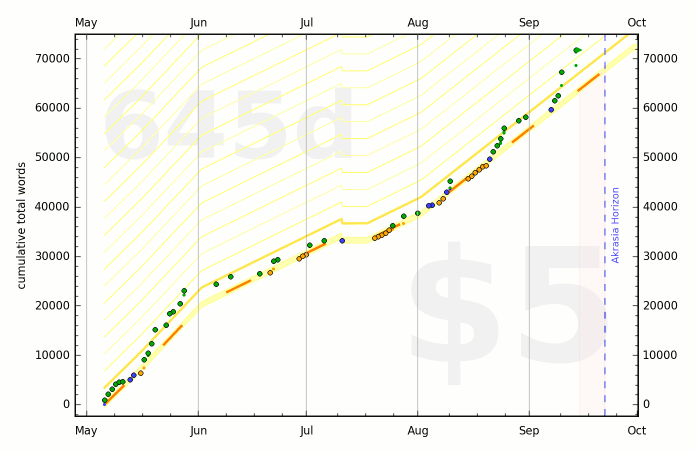
You can see a similar pattern when I started Beeminding fiction:
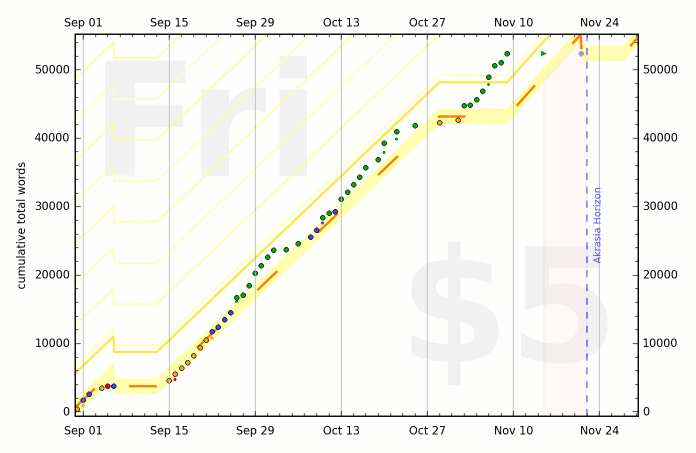
And when I started Beeminding time spent writing:
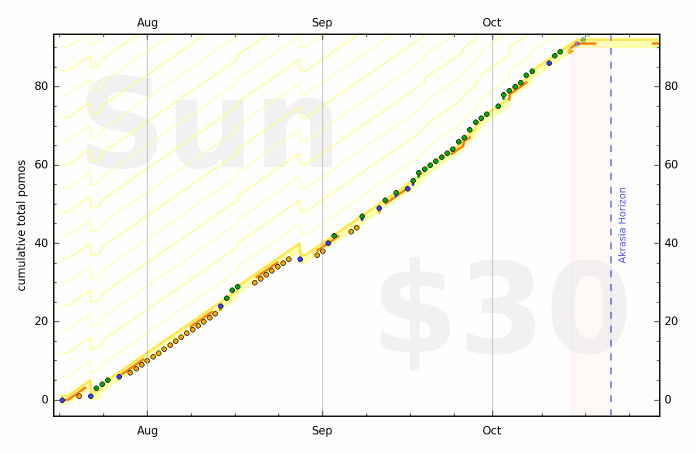
Those little spurs three data points into the time graph and seven into the fiction one? That’s where I failed to keep up and ended up giving Beeminder money. They call this “derailing”.
It may take a few derailments, but you should eventually find yourself routinely exceeding your starting goal (if you don’t, either this advice doesn’t work well for you, or you set your original goal too high). Be careful of allowing success to ruin your habit; try and write at least X words each day, not X words each day on average over the course of a week.
The number of days before you derail on a goal in Beeminder is called “safety buffer”. For outputs you intend to Beemind daily, I recommend setting yourself up so that you can have no more than two days of safety buffer. This lets you save up some writing for a busy day or two, but doesn’t let you skip a whole week. If you have a premium plan, Beeminder allows you to automatically cap your safety buffer, but you can also do it manually if you’re disciplined (I did this for many months until I could afford a premium plan).

When you get to the point of regularly trimming your safety buffer you’re almost ready to move on up. Once you’re really, really sure you can handle more (i.e. exceeded your minimum every day for two weeks), slowly increase your commitment. You don’t want to get too cocky here. If you’re currently aiming for 150 words/day and 9 days out of 10 you write 250, set your new goal to 200, not 250. You want to feel like you’re successfully and competently meeting your goal, not like you’re scrapping by by the skin of your teeth.
Step 4: Make Molecules
Once you become comfortable with your atomic goals and find stable long term resting spots for them, you can start to Beemind more complex outputs. This is using Beeminder to directly push you towards your goals. Want to work on your blog? Beemind blog posts. Want to work on a book? Beemind pages or chapters or scenes. Want to keep a record of your life? Beemind weekly journals.
These are all complicated outputs made up of many words or minutes of writing. You won’t finish them as regularly. It’s easy to sit down and crank out enough words in an hour to hit most word count goals. But these larger outputs might not be achievable in a single day, especially if you have work or family commitments. That’s why you want your writing habit well established and predictable by the time you take them on.
Remember, you don’t want to set yourself up for failure if it’s at all avoidable. Don’t take on a more complex output as a Beeminder goal until you have a sense of how long it will take you to produce each unit of it and always start at a rate where you’re sure you can deliver. Had a few weeks of finishing one chapter a week? Start your Beeminder goal at one chapter every ten days.
It’s easy to up your Beeminder goal when you find it’s too lenient. It’s really hard to get back into writing after a string of discouragements caused by setting your goals too aggressive.
Even when you manage to meet overambitious goals, you might suffer for it in other ways. I’m not even talking about your social life or general happiness taking a hit (even though those are both very possible). Stretching yourself too thin can make your writing worse!
I had a period where I was Beeminding regularly publishing writing at a rate faster than I was really capable of. I managed to make my goal anyway, but I did it by writing simple, low-risk posts. I shoved aside some of the more complex and rewarding things I was looking forward to writing because I was too stubborn to ease back on my goal. It took me months to realize that I’d messed up and get rid of the over-ambitious goal.
It was only after I dialed everything back and gave myself more space to work that I started producing things I was really proud of again. That period with the overambitious goal stands out as one of the few times since I started writing again where I produced nothing I’m particularly proud of.
Tuning down the publishing goal didn’t even cause me to write less. I didn’t dial back my atomic goals, just my more complicated one, so I was still writing the same amount. When I was ready to begin publishing things I’d written again, I started the goal at a much lower rate. After a few months of consistently exceeding it, I raised the rate.
Here’s what my original goal looked like:
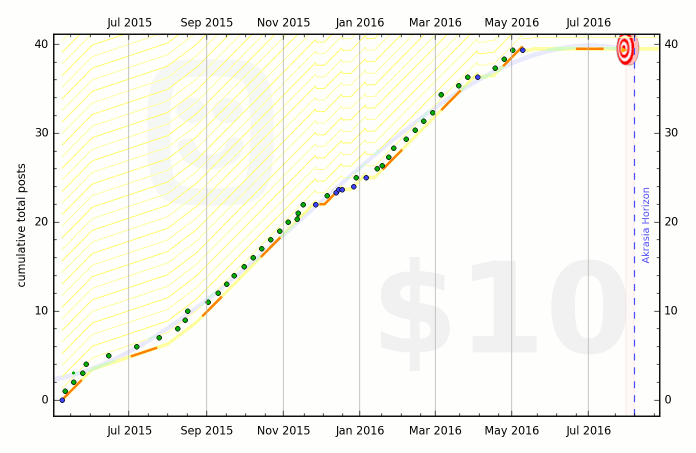
Here’s my new blogging goal:
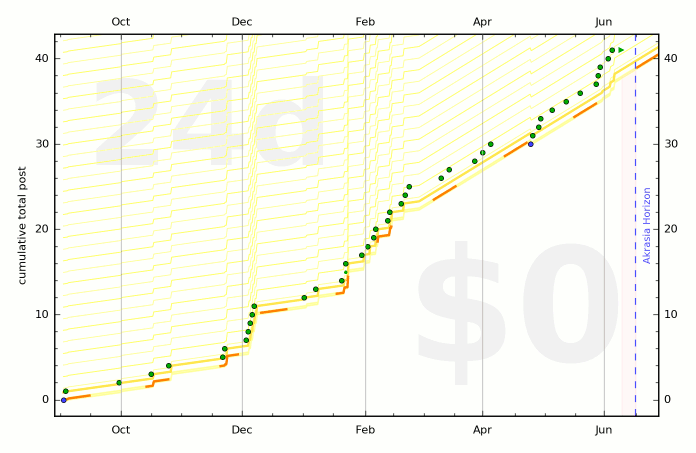
As you can see, I learned my lesson about over-ambition.
Step 5: Vanquish Guilt
At the same time as you work on Beeminding more complex outputs, you will want to be examining and replacing the guilt based motivation structure you may have built to get there.
Guilt can be a useful motivator to do the bare minimum on a project; guilt (and terror) is largely what got me through university. But guilt is a terrible way to build a long-term habit. If writing is something you do to avoid a creeping guilt, you may start to associate negative feelings with writing; if you started a writing habit because you love writing, then you’re risking that very love if you motivate yourself solely with guilt.
I recommend looking at Beeminder not as a tool to effectively guilt yourself into writing, but as a reminder of what writing is worth to you. You value consistently writing at $X. You know that every time you skip writing for a day or a week, there is a Y% chance that you might lose the habit. Multiply those two together and you get your ideal maximum Beeminder pledge.
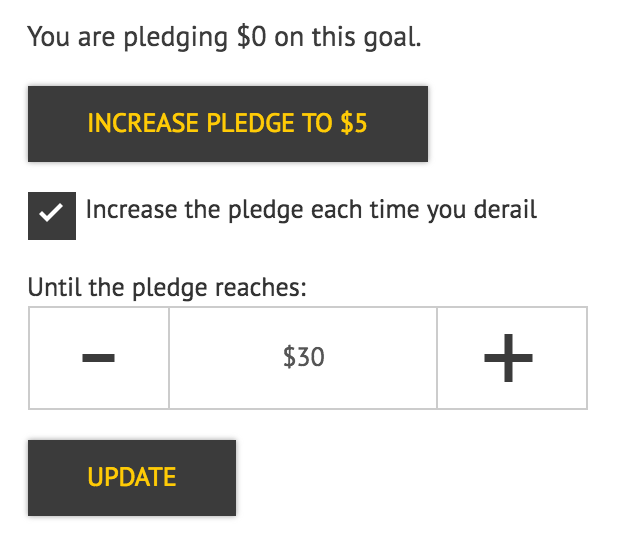
It’s entirely rational to choose to derail on Beeminder if you value something else more than you value writing just then Here Beeminder is helping you make this trade-off explicit. You may know that not writing tonight costs you $Z of estimated future utility (this doesn’t necessarily mean future earnings; it could also represent the how much writing is worth to you as an entertainment), but without Beeminder you wouldn’t be facing it head on. When you can directly compare the utility of two ways to spend your time, you can make better decisions and trade-offs.
That said, it rarely comes to mutual exclusion. Often Beeminder prompts me to find a way to write, even if there’s something else I really want to do that partially conflicts. Things that I might lazily view as mutually exclusive often turn out not to be, once there’s money on the line.
It may seem hard to make this leap, especially when you start out with Beeminder. But after two years of regularly Beeminder use, I can honestly say that it doesn’t guilt me into anything. Even when it forces me to write, the emotional tone isn’t quite guilt. Beeminder is an effective goad because it helps me see the causal chain between writing tonight and having a robust writing habit. I write because I’m proud of the amount I write and I want to keep being proud of it. I’m not spurring myself with guilt and using that negativity to move forward. I’m latching onto the pride I want to be able to feel and navigating towards that.
Mere reminders to write are the least of what I get out Beeminder though. Beeminder became so much more effective for me once I started to regularly surpass my goals. Slowly, I began to be motivated mostly by exceeding them and that motivation led me to exceed them by ever greater margins and enjoy every minute of it.
For more about the perils of guilt as a motivational tool (and some suggestions on how to replace it), check out the replacing guilt sequence on Nate Soare’s blog, Minding Our Way. For a TL;DR, try “Don’t steer with guilt”.
Step 6: Success Spiral
This is the part where everything starts to come together. When you get here, guilt based motivation is but a dim memory. You write because you want to. Beeminder helps keep you on track, but you’re more likely to spend a bit of extra time writing to see the spike in your graphs than you are because you’ll derail otherwise.
When you get to this point (or earlier, depending on how you like to work), something like Complice can really help you make the most of all your motivation. Complice helps you tie your daily actions into the set long- and medium-term goals you’ve set. It has a kickass Beeminder integration that makes Beeminding as easy checking off a box. It has integrated Pomodoro timers for tracking how much time you work (and can send the results to Beeminder). It allows you and a friend to sign up as accountability buddies and see what each other get done4. And it shows you how much work you’ve done in the past, allowing you to use the “don’t break the chain” productivity hack if it works for you (it works for me).

As I finish off this piece, I find myself tired and lethargic. It’s not that I particularly want to be writing (although some of the tiredness fell away as soon as I started to type). It’s that writing every night feels like the default option of my life. As weird as it sounds, it feels like it would take me more effort to skip writing than to do it.
This is really good, because any grumpiness about writing I might start with is often gone in under five minutes. The end result of me writing – even on a day when starting was hard – is improved mood for the whole day. I love the sense of accomplishment that creating something brings.
The road here wasn’t exactly easy. It’s taken more than two and a half years, hundreds of thousands of words, incipient carpal tunnel, and many false starts. It’s the false starts that inspired me to write this. I doubt, dear reader, that you are exactly like me. Likely some of this advice won’t work for you. It is, however, my hope that it can point you in the right direction. Perhaps my false starts can save you some of your own.
I would feel deeply uncomfortable giving anyone advice on how to be a better writer; I don’t feel confident enough in my craft for that5. But I do feel like I know how to develop a kickass writing habit, the sort of habit that gives you the practice you need to get better. If you too want to write regularly, how about you give this a try?
Postscript
I think the steps outlined here could be used to help build a variety of durable habits across disciplines. Want to program, cook, draw, or learn a new language? Think that in any of those cases a daily habit would be helpful? This advice is probably transferable to some degree. That said, I haven’t tried to repeat this process for any of those things, so I don’t know what the caveats are or where it will break down. If you adapt this post for anything else, let me know and I’ll link to it here.
Acknowledgements
Thanks to the kind folks at Beeminder for helping me create some of the graphs used in this post. In addition, thanks are due for fielding my semi-panicked support requests when the graph generation caused some problems with my account.
Thanks to Malcolm Ocean of Complice for pointing me towards Beeminder in the first place and for the year in review post that spurred me to make writing my New Year’s Resolution in 2015.
Disclaimer
I genuinely like the people whose products I recommend in this blog post. I genuinely like their creations. They aren’t giving me anything to recommend their stuff.
True story: Beeminder sent out a survey about referral links and I told them they could set up a referral system, but I’d never use it. I think Beeminder and Complice are incredibly valuable tools that are tragically under-used and I don’t want to risk even the appearance of a conflict of interest that might make people less likely to follow my recommendations to use them. For me, they’ve been literally life-changing.
I’ve linked to my specific Beeminder writing goals (there are four of them) at various points throughout this post, but if you want the proof that I’m not talking out of my ass all nicely collected in one place, you can check out my progress towards all of my Beeminder goals at: https://www.beeminder.com/zacharyjacobi.
-
If this advice doesn’t work for you, don’t sweat it. I’m just a dude on the internet. This isn’t the bible. What works for me may not work for you and there’s nothing wrong with you if it doesn’t. You’ll just have to find your own way, is all. ↩
-
If Beeminder doesn’t work for you, I recommend a human accountability buddy (who will check up on your writing progress each day and maybe take your money if you aren’t hitting your goals). ↩
-
The best advice about writer’s block I’ve ever seen came from Cory Doctorow. He said that some days he feels like he’s inspired and a heavenly chorus is writing for him and other days he feels like he can’t write worth shit and has no clue what’s he’s supposed to be doing. He goes on to say that no matter how strong these feelings are, a month later he can’t tell the which words were written in which state. ↩
-
I cannot recommend this feature highly enough for people in long-distance relationships. ↩
-
For non-fiction writing advice, try the Slate Star Codex post of the same name. For more general advice, here’s tips from 23 different authors. ↩
